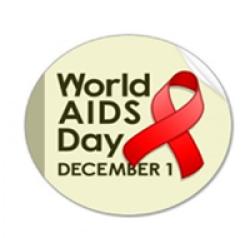
Published date
1 December 1988
Following the January 1988 meeting of Health Ministers in London, a decision was taken that 1 December would annually be observed as World Aids Day. This step was motivated by the growing realisation that, unlike other pandemics such as malaria, the spread of Human Immunodeficiency Virus(HIV) was not confined to geographic locations. The aim of World AIDS Day was to bring to people's attention the worldwide challenges and consequences of the epidemic, in order to prevent the spread of HIV and improve the lives of people living with the virus. The day was also a celebration of achievements made in the fight against this disease and aimed to focus world attention on current challenges. The first World Aids Day was observed on 1 December 1988 under the theme 'Join the Worldwide Effort'. The World AIDS Campaign, with the support of UNAIDS, facilitates the international theme for World AIDS Day. Themes celebrating World Aids Day have always reflected significant periods in the fight against the epidemic as well as challenges encountered in dealing with it. For instance, in 1988 there was a need to mobilise and sensitise societies across the globe as then the virus was considered to have been widespread only in certain regions of the world, Sub Saharan Africa for instance was considered the domain of the virus. Once it was appreciated that the virus is spread right across the globe, other challenges surfaced and inspired themes. This year, 2011,the chosen theme is “Getting to Zero – Zero AIDS-Related Deaths.” In South Africa, this day was first venerated in 1996 when the Department of Health organised a special event called the National World AIDS Day in Bloemfontein, Free State, and in Pretoria, Gauteng. On 21 November 2007, a new UN report stated that more than three-quarters of Aids-related deaths occurred in sub-Saharan Africa and South Africa was now officially the country with the highest prevalence of HIV in the world. Speaking on the same day of the release of the UN report, Health Director General Thami Mseleku said there were signs that there was a turnaround in the number of new HIV infections in South Africa.
References
world aidscampaign.org (2011). ‘History of World Aids Day’ from World Aids Campaign [online]. Available at www.worldaidscampaign.org [Accessed 01 November 2011]|
South African History Online (2011). ‘A History of HIV/AIDS in South Africa’from South African History Online [online]. Available at www.sahistory.org.za [Accessed 01 November 2011]